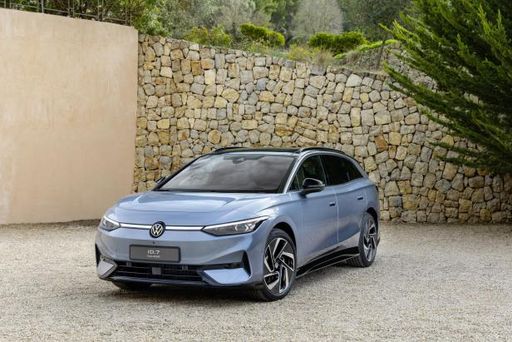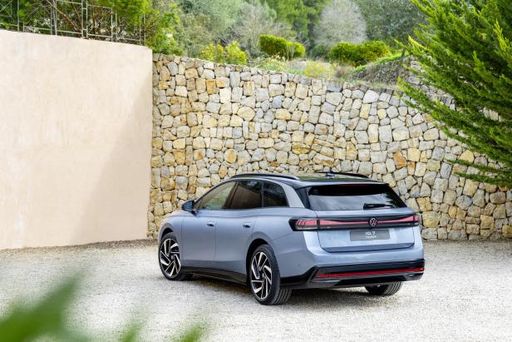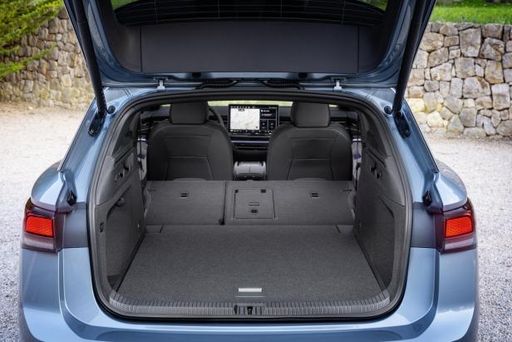VW ID.7 Touring vs Lucid Gravity – Which car suits you better?
Two cars, one duel: VW ID.7 Touring meets Lucid Gravity.
Which one wins in performance, efficiency and value for money? Find out now!
Costs and Efficiency:
Price and efficiency are key factors when choosing a car – and this is often where the real differences emerge.
VW ID.7 Touring has a decisively advantage in terms of price – it starts at 47100 £, while the Lucid Gravity costs 85600 £. That’s a price difference of around 38567 £.
In terms of energy consumption, the advantage goes to the VW ID.7 Touring: with 14 kWh per 100 km, it’s evident more efficient than the Lucid Gravity with 18.20 kWh. That’s a difference of about 4.20 kWh.
As for range, the Lucid Gravity performs minimal better – achieving up to 748 km, about 59 km more than the VW ID.7 Touring.
Engine and Performance:
Power, torque and acceleration say a lot about how a car feels on the road. This is where you see which model delivers more driving dynamics.
When it comes to engine power, the Lucid Gravity has a significantly edge – offering 839 HP compared to 340 HP. That’s roughly 499 HP more horsepower.
In acceleration from 0 to 100 km/h, the Lucid Gravity is convincingly quicker – completing the sprint in 3.60 s, while the VW ID.7 Touring takes 5.50 s. That’s about 1.90 s faster.
In terms of top speed, the Lucid Gravity performs clearly perceptible better – reaching 250 km/h, while the VW ID.7 Touring tops out at 180 km/h. The difference is around 70 km/h.
There’s also a difference in torque: Lucid Gravity pulls decisively stronger with 1232 Nm compared to 679 Nm. That’s about 553 Nm difference.
Space and Everyday Use:
Cabin size, boot volume and payload all play a role in everyday practicality. Here, comfort and flexibility make the difference.
Both vehicles offer seating for 5 people.
In curb weight, VW ID.7 Touring is a bit lighter – 2191 kg compared to 2522 kg. The difference is around 331 kg.
In terms of boot space, the Lucid Gravity offers noticeable more room – 780 L compared to 605 L. That’s a difference of about 175 L.
In maximum load capacity, the Lucid Gravity performs convincingly better – up to 3398 L, which is about 1684 L more than the VW ID.7 Touring.
When it comes to payload, Lucid Gravity convincingly takes the win – 798 kg compared to 465 kg. That’s a difference of about 333 kg.
Who comes out on top?
Overall, the Lucid Gravity shows itself to be leaves the rival little chance and secures the title of DriveDuel Champion.
It convinces with the more balanced overall package and proves to be the more versatile choice for everyday use.
Lucid Gravity
VW ID.7 Touring
The VW ID.7 Touring represents a new chapter in Volkswagen's electric vehicle lineup, offering a seamless blend of style and sustainability. This estate car is designed to provide ample space and comfort for both passengers and luggage, making it ideal for long journeys. With advanced technology features and a focus on eco-friendly performance, the ID.7 Touring is set to appeal to environmentally conscious drivers who don’t want to compromise on practicality or luxury.
details @ Volkswagen
@ Volkswagen
 @ Volkswagen
@ Volkswagen
 @ Volkswagen
@ Volkswagen
Lucid Gravity
The Lucid Gravity stands out as an impressive all-electric SUV that promises to redefine luxury and performance for adventure-loving drivers. With its sleek design and spacious interior, it offers a first-class travel experience, coupled with cutting-edge technology and style. As the SUV market continues to embrace electrification, the Lucid Gravity is setting new standards in both efficiency and elegance.
details
 @ Volkswagen
@ Volkswagen
|
|
|
|
|
Costs and Consumption |
|
|---|---|
|
Price
47100 - 54900 £
|
Price
85600 - 100200 £
|
|
Consumption L/100km
-
|
Consumption L/100km
-
|
|
Consumption kWh/100km
14 - 16.6 kWh
|
Consumption kWh/100km
18.20 kWh
|
|
Electric Range
584 - 689 km
|
Electric Range
545 - 748 km
|
|
Battery Capacity
77 - 86 kWh
|
Battery Capacity
-
|
|
co2
0 g/km
|
co2
0 g/km
|
|
Fuel tank capacity
-
|
Fuel tank capacity
-
|
Dimensions and Body |
|
|---|---|
|
Body Type
Estate
|
Body Type
SUV
|
|
Seats
5
|
Seats
5
|
|
Doors
5
|
Doors
5
|
|
Curb weight
2191 - 2336 kg
|
Curb weight
2522 - 2684 kg
|
|
Trunk capacity
605 L
|
Trunk capacity
780 L
|
|
Length
4961 mm
|
Length
5035 mm
|
|
Width
1862 mm
|
Width
2000 mm
|
|
Height
1549 - 1551 mm
|
Height
1658 mm
|
|
Max trunk capacity
1714 L
|
Max trunk capacity
3398 L
|
|
Payload
459 - 465 kg
|
Payload
636 - 798 kg
|
Engine and Performance |
|
|---|---|
|
Engine Type
Electric
|
Engine Type
Electric
|
|
Transmission
Automatic
|
Transmission
Automatic
|
|
Transmission Detail
Reduction Gearbox
|
Transmission Detail
Reduction Gearbox
|
|
Drive Type
Rear-Wheel Drive, All-Wheel Drive
|
Drive Type
All-Wheel Drive
|
|
Power HP
286 - 340 HP
|
Power HP
568 - 839 HP
|
|
Acceleration 0-100km/h
5.5 - 6.7 s
|
Acceleration 0-100km/h
3.6 - 4.2 s
|
|
Max Speed
180 km/h
|
Max Speed
250 km/h
|
|
Torque
545 - 679 Nm
|
Torque
1232 Nm
|
|
Number of Cylinders
-
|
Number of Cylinders
-
|
|
Power kW
210 - 250 kW
|
Power kW
418 - 617 kW
|
|
Engine capacity
-
|
Engine capacity
-
|
General |
|
|---|---|
|
Model Year
2024
|
Model Year
2026
|
|
CO2 Efficiency Class
A
|
CO2 Efficiency Class
A
|
|
Brand
VW
|
Brand
Lucid
|
What drivetrain options does the VW ID.7 Touring have?
The VW ID.7 Touring is offered with Rear-Wheel Drive or All-Wheel Drive.
The prices and data displayed are estimates based on German list prices and may vary by country. This information is not legally binding.
